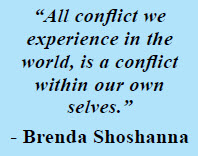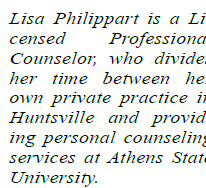Resolving Conflict
 By: Lisa Philippart
By: Lisa Philippart
Conflict is a normal part of any healthy relationship, personal or professional. When conflict is mismanaged, it can cause great harm to a relationship, but when handled in a respectful, positive way, it provides an opportunity to strengthen the bond between two people. Conflict arises from differences, both large and small, whenever people disagree over their values, motivations, perceptions, ideas, or desires. Although some differences may seem trivial, when a conflict triggers strong feelings, a deep personal need is often at the core of the problem. These needs can range from needs of safety and security, to respect and value, or to the greater need of closeness and intimacy. In personal relationships, a lack of understanding about differing needs can result in distance, arguments, and breakups. In the workplace, differing needs can result in broken deals, decreased profits, and lost jobs.

Do you fear conflict or avoid it at all costs? If your perception of conflict comes from painful memories from your childhood or previously unhealthy relationships, you may expect all disagreements to end badly. You may have been taught to view conflict as demoralizing, humiliating, or fear-producing. To the extreme, if you felt powerless or out of control, conflict may even be traumatizing for you. If you are afraid of conflict, it can become a self-fulfilling prophecy. If you enter into a conflict situation already feeling threatened, it’s tough to deal with the problem at hand in a healthy way. Instead, you are more likely to either shut down or blow up in anger. Conflict triggers strong emotions, leading to either resentments (unhealthy) or trust (healthy.) Your ability to successfully resolve conflict depends on your ability to manage stress quickly by remaining alert and calm. This allows you to accurately read and interpret verbal and nonverbal communication. When you are in control of your emotions, you can communicate your needs without threatening or intimidating others. Pay attention to the feelings being expressed, as well as the spoken word of others.

To successfully resolve a conflict, you will need to learn and practice two core skills: quick stress relief and emotional awareness. Quick stress relief is being able to manage and relieve stress in the moment. You will need to practice staying centered and in control of your emotions. To handle your stress, be aware of your own feelings and in touch with your needs. And then, appropriately communicate these emotions and needs clearly. Take a deep breath, allow yourself to pause, or even state, “I need a moment to think about that,” as you process both your emotional and rational responses. Emotional awareness is the key to understanding yourself and others. Although knowing your own feelings may sound simple, you may be ignoring or suppressing strong emotions like anger, sadness, and fear. Your ability to resolve conflict depends on being connected to these feelings. In other words, emotional awareness is the conscious recognition of your moment-to-moment feeling experience. Emotional awareness allows you to understand yourself and others, including what is really the troubling issue, and to communicate clearly and effectively to engage and influence others.

Finally, you can ensure that the process of managing and resolving conflict is as positive as possible by sticking to the following guidelines:
1. Listen for what is felt as well as said.
2. Make conflict resolution the priority rather than winning or being right.
3. Focus on the present moment.
4. Pick your battles.
5. Be willing to forgive.
6. Know when to let something go.
Using these conflict resolution skills can help to put the situation into perspective, and can actually become an opportunity for growth and greater connection.
By: Lisa Philippart
Licensed Professional Counselor